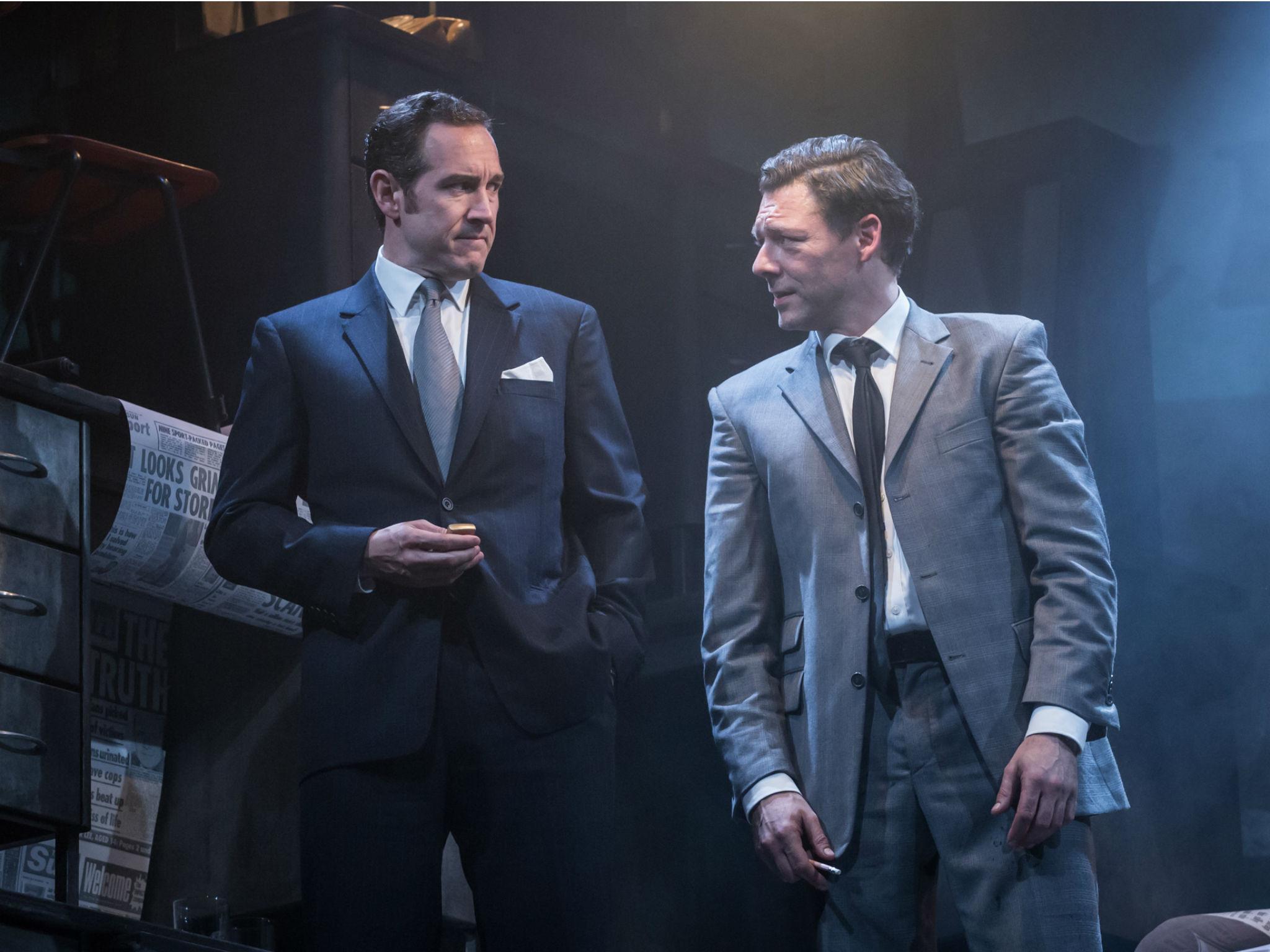Ink, Duke of York’s, London, review: Truly thought-provoking
Following a sell-out season at the Almeida, James Graham's play about a young Rupert Murdoch and his acquisition of The Sun newspaper in 1969 , has now transferred to the West End

In an early scene in this story of the birth of the modern Sun newspaper, editor Larry Lamb is recruiting a photographer. He tells him he will want him to shoot girls. “Naked?” queries the photographer. “No,” says a shocked Lamb. “Bra and knickers. Tasteful.”
Well, things rapidly got less “tasteful” as we know. The Story of Murdoch’s acquisition in 1969 of the ailing Sun from Mirror Group boss, the legendary, genuine populist with a mission to explain, Hugh Cudlipp -- a decision that was to haunt Cudlipp -- is well known. But this superb play by James Graham, now transferred to the West End from the Almeida, makes it feel fresh. Also, because it eschews the all too easy mockery for an even-handed approach, it is truly thought-provoking.
Murdoch is played by Bertie Carvel, the cheating husband from TV’s Doctor Foster. It is a nuanced portrayal, the Murdoch of 1969 being far from the right-wing ogre that he is seen as now, and more a genuine outsider with a passion for newspapers, a passion to cater to popular demand, contempt for any establishment, but particularly the British establishment, and more left of centre than we might care to remember.
Carvel captures all of this in his nuanced portrayal of a slightly edgy, nervy but still ruthless man. But there is a lack of the rawness that was, and is, a part of his personality. And I found the decision not to give him a fully fledged Australian accent, surely an intrinsic part of his persona, baffling.
Carvel is nevertheless memorable, but the real star of the evening, and of The Sun’s rise, as the play makes clear, is the bluff Yorkshireman, Larry Lamb, brilliantly played by Richard Coyle. Lamb, a former Mirror man and protégé of Cudlipp, feels that he wasn’t properly promoted on the Mirror, and Coyle brings out not just the pioneering talent for changing the boundaries of newspapers, but the chip on his shoulder which helped propel it.
Lamb’s relationship with Cudlippp, a marvellously authentic performance by Jonathan Coy, is as central to the play as Lamb’s relationship with Murdoch. Cudlipp feels betrayed by his “boy”, Lamb unappreciated by his mentor. So he rips off everything from the Mirror and takes it the extra yard. (Their Lively Letters column becomes Liveliest Letters).
Lamb is the one with real ruthlessness, the one who takes populism to places that even Murdoch hadn’t dreamed of, and certainly the last editor of The Sun that Murdoch deferred to.
He, much more, than the infinitely better known Kelvin MacKenzie, shaped The Sun that we see today. Yet few people have heard of him. Indeed, James Graham said in an interview, published in The Independent recently, that one of his fascinations was how Lamb has been “expunged from history”.
Gloriously directed at a frenetic pace by Rupert Goold, the play gives nods to Lamb’s introduction of hitherto unthinkable stories and headlines, “Werewolf seizes couple in Southend”, and 12-page coverage of television and its celebrities (anathema to other papers, which saw TV as a rival). But the play really pivots on two central episodes.
The first is the awful kidnap and murder in 1970 of Muriel McKay, the wife of Murdoch’s deputy chairman Alick McKay. Ms McKay was taken mistakenly by the kidnappers, who thought they had seized Murdoch’s then wife, Anna. She was killed and her body fed to the pigs on the farm where the kidnappers were holding her. Against the advice of the police, his own staff and Murdoch himself, Lamb gave front page coverage to her capture day by day, and there was speculation that this may have hastened her death. Lamb, obsessed with increasing sales, was unrepentant.
The second issue is the introduction of the semi-naked Page 3 girls, which finally saw The Sun’s sales overtake the Mirror. Lamb did this, behind Murdoch’s back according to the play, as a first birthday gimmick for the new Sun (the girls, yes, being in their birthday suits). In a riveting scene the first bare-breasted model confronts Lamb in his office, agrees to his request, but challenges him on whether he would let his own daughter do it, and would he countenance millions of people staring at her body?
Later in the play Lamb regrets Page 3, musing ruefully and presciently that it will be the focus of his obituary. But Murdoch, initially repelled by the idea, has warmed to it, and it stays.
If I have any quibbles with the play, they are very slight. I think it unlikely that Murdoch was entertaining a move to the exact location of Wapping back in the Seventies; and I’m not convinced that “bonking” was part of the language in 1969. But one can’t quibble with the fact that this is an unmissable evening, and the theatre the right place to tell in gripping fashion what is, like it or not, a vital moment in British social history.
Subscribe to Independent Premium to bookmark this article
Want to bookmark your favourite articles and stories to read or reference later? Start your Independent Premium subscription today.

Join our commenting forum
Join thought-provoking conversations, follow other Independent readers and see their replies